- Home
- William Goldman
Control Page 12
Control Read online
Page 12
“Oh,” Haggerty muttered out loud, because he found then, at the bottom of her purse, a small white envelope and inside were the remnants—frayed and faded and broken—of what had clearly once been rose petals. Haggerty stared at them, feeling guilty. I hope he loved you, Haggerty thought, or at the very least, I hope he didn’t break your heart. Usually, his mind didn’t range so close to the sentimental—
—but there was something about this body that bothered him. The angle. The angle of the neck. Of the broken neck—he was no doctor but surely it had to have been broken. He’d never seen a neck quite like that before, God knew what the weapon was, what size club. And he wanted to talk about the angle, speculate on it with Eric.
Only Eric was late. Haggerty glanced at his watch, blew on his hands, knelt down by the red-haired woman and waited in the February cold.
It was several minutes before Haggerty heard the familiar footsteps coming toward him. He was shivering now as he stood, looked at the approaching younger man. “What the hell kept you?” he said.
“Your crap,” Eric said, and he shoved a pint bottle of colorless liquid into Haggerty’s big hands.
“Not here, Jesus,” Haggerty said, looking around in an almost furtive way, quickly pocketing the bottle. It was DMSO and Haggerty practically lived on it now. He had bursitis in his right shoulder and arthritis in both hands and the DMSO had been his salvation, ever since he heard about the liquid one night on 60 Minutes. It was a paint solvent, controversial, and illegal, at least in New York. Haggerty talked about it a good deal after he’d seen the program and he wondered aloud to Eric if it would help his problems and sometimes they would pass drugstores that sold it even though it wasn’t legal and Haggerty would say again how curious he was as to whether it would help or not.
“Buy some you’re driving me crazy,” Eric would urge, only Haggerty wouldn’t, and that was how things went until Eric realized the old man never would, because he’d been a cop for thirty-plus years now, immaculate, and what if he got caught?
So Eric bought it for him, scowling but dutiful, and Haggerty repaid him to the penny and what drove Eric almost round the bend was that stores never always had it—one week yes, then six months without—so he had to skulk around buying the liquid pints where he could find them.
Haggerty got instant relief and it kept his pain bearable. It was indeed a wondrous substance, DMSO, except for the garlic side effects. Not only did your breath smell of garlic, so did your body, and Haggerty took to concealing the former problem by becoming at his age a compulsive Dentyne man.
And he all but bathed in Aqua Velva. Not only did he rub it on his face after shaving, he kept some in the glove compartment of his car. And each morning he would soak his shirt in Aqua Velva, waiting for it to dry, enduring the odd looks that sometimes came his way …
He watched now as Eric knelt by the dead woman, studied the horrid angle of the neck. He looked up at Haggerty. “What do you think did it?” Haggerty said quietly.
Eric stood. “Pray it wasn’t a fist,” he replied, staring now at the fat lady surrounded by broken glass who was talking to the young patrolman who first reported the violence.
“Us decent citizens are the backbone of the city,” the fat lady began. “How are we supposed to live here with the crime all around? Where were you when I needed help, giving a jaywalking ticket to a cripple?”
“We do the best we can, ma’am,” the young patrolman said.
“All my hard-earned precious things, gone. Gone,” she said, then she said “ouch”—this last referred to a piece of crystal that jabbed Into her as she changed into a different sitting position.
“An ambulance should be here real soon,” the young patrolman said, consolingly. “We’ll get you to a first-class hospital, they’ll check you out right away, you’ll feel a whole lot better ma’am, I can promise that”
And now there were tears in the fat lady’s eyes. “I had mementos, “ she said. “Family memories. Heirlooms I was carrying— I’m not going to feel better, I’ll never feel better, they’ll probably check me out and find I got cancer.”
“Don’t work yourself up, ma’am; please.”
Now the tears were streaming down her face, “Lemme tell you something: you’re young, you don’t know this yet, I’m old so I do —life is a bummer.”
“I understand why you’re upset, you’ve got every reason to be upset, but—”
“—a bummer, you get me? I support my family, I work seven days out of seven, when’s my reward?” Now she lifted her tear-stained face to the sky. “I’m waiting, God” The young cop quickly handed her his handkerchief. The fat lady buried her face in it and made sobbing sounds.
Eric could not help applauding.
Her face snapped away from the kerchief, her eyes searching, bright with anger.
“It’s me, Sophie,” Eric said, moving toward her.
“Oh hey, Eric,” the fat lady said, “you on this?”
“It’s possible.”
“Good. Cause this putz—” she jerked a thumb at the young patrolman—”he don’t know shit.”
“What’s going on?” the young patrolman said.
“She was about to hit you for a loan of ten,” Haggerty explained. “That’s what the tears were building to.”
“You win some, you lose some, it never hurts to try,” Sophie said.
“There is a shaky black man who works 34th Street,” Eric said.
Sophie cut in—”Jimmy the hat?”
Eric nodded. “He and Sophie here are royalty.” He turned to the young patrolman. “The king and queen of shoplifters. The first time I ran Sophie in I was stunned—not by the amount—any gonif can steal a lot—but by the exquisite taste of what she’d acquired that day. But I never knew you to go in for crystal,” Eric said, pointing to the broken bits of glass surrounding her.
“I’m innocent—I swear—I was mugged just like an ordinary person.”
Haggerty looked at the young patrolman. “Maybe the ambulance is here.” He pointed up toward the street.
The young patrolman hesitated, then left them.
“That’s fanny,” Sophie said then. “I thought it was him.”
“You thought what was him?”
“I smell Aqua Velva—figured it was the young guy.”
“I don’t smell any Aqua Velva,” Haggerty said quickly. “Get on with your story.”
“Somebody stinks of Aqua Velva,” Sophie insisted. “I got a sensitive nose and it’s gonna make me sneeze.”
‘There’s no goddam Aqua Velva!” Haggerty said loud. “Now quit stalling.”
Eric looked dead at her then. “We’re dealing with a murder, so don’t screw around.”
“Okay, okay, just—” She sneezed then. Then she did it again. Then she started to talk. “I was done for the day and heading to meet my girl friend at this bar on First.”
“Anything we can trace?”
Sophie shook her head. “Watches and bracelets mostly. Nothing real unusual.”
“See the guy?”
“It happened so unexpected. I felt this pull when the hand went over my mouth and I tried fighting it but no way.”
“Color?”
“Couldn’t tell. He hit me and I went out except I heard—I think I did anyway, heard this woman yelling to stop it. Then I drifted. He murdered her?”
“She was gonna see Chorus Line,” Haggerty said.
“Can I have her ticket?” Sophie asked.
“Your stock,” Eric told her, “just went down.”
The Assistant Medical Examiner hated his life. If he had been Chief Medical Examiner it would have been no rosebed since he had, from childhood, been an opera lover and more than anything wanted to be Richard Wagner. But being assistant and at the same time being four years older than his superior made for a lot of long nights. He sat in his office now and looked at the two detectives. “You want a shot?” he asked Eric, taking a bottle of rotgut from his desk. “Either of you?
”
“We’re on duty,” Haggerty said. He tried not to rub his right shoulder.
“We’re all on duty,” the Assistant Medical Examiner said, taking a long swallow.
“Was it a hand?” Eric said.
“I would think.”
“I’ve got big hands,” Eric said, “but not half big enough to do that. Haggerty’s got hams and he couldn’t do it either. What are we dealing with? Why did he kill her? He could have just dazed her like he did Sophie.”
The Assistant M.E. took another drink.
Eric looked at Haggerty. “I think it’s someone new in town.”
“You keep track of killers do you?” the Assistant M.E. said.
“Yeah, he does,” Haggerty said.
“Shit,” Eric said and he stood. “As if we didn’t have enough already.”
“You sure it was motiveless?” the Assistant M.E. asked.
“Just a lady librarian come to town for a spin,” Haggerty said. He looked at his watch. It was after ten. “She was gonna see Chorus Line but it’s too late now.”
“Life’s full of tragedy,” the Assistant Medical Examiner replied. “I almost had a ticket to the Met.” He finished the bottle, lobbed it toward his wastebasket, missed. It hit the hard floor and shattered. They left him picking up the pieces…
Outside, the February night was frosting up. “You go on home,” Eric said. Haggerty had taken a small one-room place over near Yorkville between First and York. It wasn’t much, but he hadn’t needed much after Helen had died three years before.
“You?”
“I’m itchy,” Eric said.
“Want company?”
Eric saw from the way Haggerty was favoring his right side that the bursitis was hitting him bad. He made a face, sniffed the air several times.
“Bullshit, you don’t smell it, I put in a fresh piece of gum not ten minutes ago.” Then he paused. “Do you smell it? Am I garlicky? Tell me goddamit.”
“It’s not as bad as sometimes,” Eric said. He loved tormenting Haggerty about the DMSO. The truth was that since he’d started using the stuff, between the Dentyne and the Aqua Velva, he’d never smelled better. Eric told him so.
“Everyone’s a critic,” Haggerty said as he waved, walked away…
It was well after ten and Eric headed for Port Authority. When he hit Times Square he stopped in a liquor store and bought a pint of Jack Daniel’s. Putting it in his pocket, he walked to the bus station and inside, hoping it wouldn’t take him forever to locate Tillie.
A cop is as good as his contacts, “voices” Eric called them; he had fewer than many of his peers, but he valued them, treated them as well as he possibly could, none better than Tillie.
Because she was so frail.
Frail and ancient with no last name and her life had altered - years before when she saw John Gielgud walking through the bus station, coming back to the city from Princeton. She had seen his Hamlet, Tillie told Eric once, and that man on that stage was the most beautiful creation of God, except for Liberace in his early days on television.
If a legend like Sir John could walk Port Authority, the possibilities were indeed endless and through the years Tillie had spotted Henry Fonda twice, the second time with Joshua Logan, and John Travolta before he got famous but she knew he would she said, from the walk he had and his eyes. If there was such a thing as perfect pitch, and there was, Tillie had as close to perfect face memory as anyone Eric had encountered and she had been helpful to him many times on runaways. She lived in the terminal now, alone with her plastic bags, and the police let her pretty much to herself once Eric passed the word. Usually she located herself on the front bench at the second floor where most of the people had to pass by. Occasionally she walked around the building and she was good friends with a pusher who shined shoes directly across on Eighth Avenue. Once a week she trudged to Grand Central for a shower.
Eric moved into the row of benches behind her now. He took off his topcoat, folded it beside him. Tillie was staring ahead at the stragglers hurrying for their late buses to wherever. Eric leaned forward, put his strong fingers to her neck, gently began massaging her old skin. “Don’t ever stop,” Tillie said.
“Very tense,” Eric told her. Especially the right side. She carried her bags mostly with her right arm and the strain was apparent.
“Saw the saddest thing, Eric—around noon—two girls—thirteen at the most—one just a beauty, other all fat and pimply-—they sat down at the end of this row and you knew they didnt know what to do now—come this far, got to the Apple, but then what? -—and this slick fella, he descended, you gather me—big hat, slick clothes, white teeth—and he sat between ‘em and offered butts and they all lit up an’ then a joint an’ they lit that too—now this slick guy he put his fingers on the beaut’s arm—talkin’ and rubbin’ her skin—she listened and it was like he was the answer to all her prayers she had that kind of look when she left with him—just a beaut an’ you know she’ll be dead in three years.”
“Sad all right,” Eric said.
“No,” Tillie said, her tone almost reprimanding. “Just shut up till I get to the sad part, I’m not there to the sad part yet, Eric, what’s the matter with you?”
“Sorry.”
“The fat pimply one—they left her fiat—she just stared after ‘em and then she cried and cried—when you can’t even give it away, that’s sad.”
Eric reached into his coat pocket for the Jack Daniel’s.
“I didn’t say you could stop massaging.”
Eric handed her the bottle.
“That’s a good enough reason.” She opened it, took a drink. But very daintily. Everything Tillie did was like that—the movements graceful and small. She gestured now for him to sit beside her. He moved up a row. “Pretty as ever,” Tillie said. Thai: “What you after?”
Erie told her.
“Don’t think so,” she said after a moment “No giants recently.”
Eric shrugged; it was a long shot
“Saw a female must have stood six eight. Slumped so I couldn’t be positive—but six eight seemed about right.”
A lot of newcomers to the city lingered around Port Authority. Eric asked her to call if anything happened.
“Six eight,” Tillie mused, taking another dainty swallow. Then a third, then a fourth. She put the bottle into one of her plastic bags. She never slept really. But she napped a lot “Six eight and a girl—eves if you looked like Garbo, who’d care? Isn’t that sad, six eight?”
“Not if she has a hook shot,9’ Eric said. He got up, grabbed his coat.
Tillie lay down on the bench, muttering she’d outlived everyone she’d ever cared for.
Eric thought that might be the saddest thing of all…
He loved his apartment Not the building—it was just another of the new-ugly-white brick-soon-to-be-slum jobs that dotted Manhattan, where even the hard of hearing knew when the neighbor upstairs flushed the John.
But the location was something else again. Eric lived on the thirty-fifth floor overlooking Lincoln Center. In the middle of the Met there were the Chagall tapestries. And always the great open plaza between the three theatres. Balanchine worked there, Bach was played; Sills sang, Perlman fiddled. It was nice to know that, to remember it each night you came home from dealing with the bruised citizens or the terrifying young who were coming up through the pavements like some vile new growth from the center of the earth—they had no consciences, these young.
Eric opened his refrigerator, took out two bottles of beer, careful not to check the labels. He opened them both, poured them into tall thin glasses, making sure there was half to three quarters of an inch of foam at the top. Then he carried the glasses to the large window that viewed the plaza. He swirled the glasses, one after the other, checking for cling; he carefully compared their bouquets and colors. The tasting moment was coming up now, and he smiled at how much he enjoyed the anticipation.
He had been, for half a dozen y
ears now, into beer. He had always liked it, how could anyone not like it, but his interest had only become deep when he got involved in a case with a man who was an importer. All had ended well, they became distantly acquainted, and the man, to show his gratitude for his wife’s safe return, began giving Eric bottles and packs and cases of beer, many of them not ordinarily available in America. Some of them were upchuck-making—probably you had to be a native Tanzanian to truly enjoy the subtleties of Kilimanjaro lager, of Tusker brewed in Kenya—but many, if not most, were stunning. St. Pauli Girl and Pilsner Urquell were famous, and thank God for that, but Schwechater was at least their peer and…
Eric tasted the first beer. Ann. Excellent. German more than likely. Perhaps Bavarian in locale. Probably bottom fermented.
Now the second. Ahhhk Lighter, yes, but a clarity of flavor that was quite remarkable.
Again the first. Excellent. High marks.
Again the second. The winner, no question.
Eric went back to where the bottles were, checked the first. Jever. Remember that name, an outstanding product; Jever. Now he put the Jever down, checked the second bottle.
Piels?
Eric stared at it. Piels for Chrissakes. I must really be tired. He laughed out loud, finished both bottles, and soon was sleeping.
He was up the next morning before dawn, exercised, showered, dressed, headed for the 19th, poured a mug of coffee, started working the phones. It took three hours before he lucked out.
“Yeah we had a break, two days ago,” the voice said.
‘I’ve been calling institutions where there’s been trouble,” Eric said. “Just where in Illinois are you?”

 The Princess Bride
The Princess Bride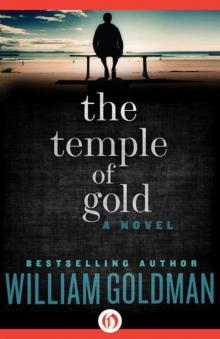 The Temple of Gold
The Temple of Gold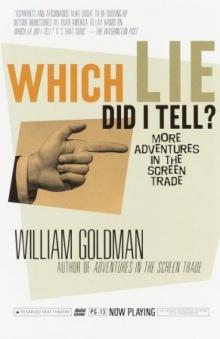 Which Lie Did I Tell?: More Adventures in the Screen Trade
Which Lie Did I Tell?: More Adventures in the Screen Trade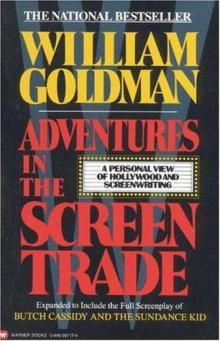 Adventures in the Screen Trade
Adventures in the Screen Trade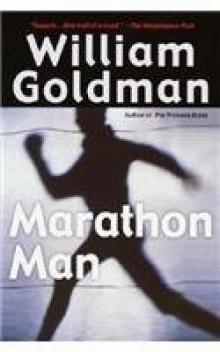 Marathon Man
Marathon Man The Novels of William Goldman: Boys and Girls Together, Marathon Man, and the Temple of Gold
The Novels of William Goldman: Boys and Girls Together, Marathon Man, and the Temple of Gold Boys and Girls Together: A Novel
Boys and Girls Together: A Novel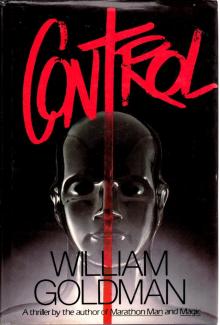 Control
Control The Novels of William Goldman
The Novels of William Goldman Which Lie Did I Tell?
Which Lie Did I Tell? Boys & Girls Together
Boys & Girls Together